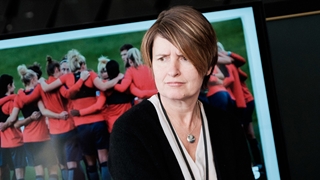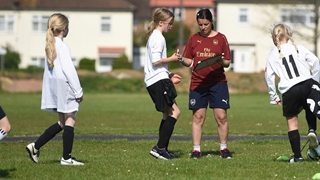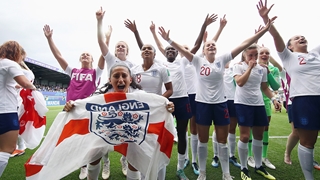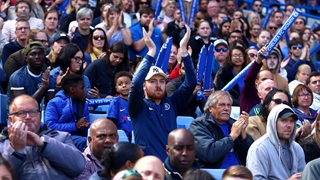
I describe my journey to a career in football as a bit of an accident. I’ve always been a football obsessive, but it was never my life plan to dedicate a career to the game.
To be honest, I didn’t think a career in football existed for a female. One of the big driving forces behind the career I have forged is that I wasn’t allowed to play football at school. That’s why I’m so passionate about helping to leave a legacy for this generation to have many more opportunities than I had.
Now it's a fantastic industry for a female to work in, whether you want to be a professional player, coach, referee, lawyer, marketeer; there’s plenty of different options available.
The fully professional Barclays FA Women’s Super League [WSL] is a prime example of that, you have more and more women in roles on and off the pitch, and it’s absolutely brilliant to see. We need to champion and encourage that.
I’d enjoyed a variety of roles at the FA before I took my current role as women’s professional game director in September 2018. My remit is to help transform the women’s pyramid and deliver professional women’s football in England. As well as the Barclays FA WSL, the role includes the FA Women’s Championship, the FA Women’s National Leagues and the Women’s FA Cup and Continental Tyres League Cup.
My role coincided with the landmark first season of a fully professional FA WSL in 2018-19, seven years after its creation in 2011. I was in no doubt the role was a big challenge, but a very exciting one.
Our ambitions are big. No women’s sport has yet broken through and competed with men’s sports and leagues. But I genuinely believe that our leagues can be the catalyst for women’s sport breaking into the mainstream, getting domestic exposure week in, week out.
With that comes transformational change; new fans, increased revenue and the world’s best players. We want the Barclays FA WSL to be the world’s most successful league, on and off the pitch.
For that vision to be achieved, we needed to work more closely than ever with the clubs. In the short-term we needed to help guide the clubs from a semi professional to professional environment.
The increased expectations, standards and criteria meant it was a big leap for many, but one that they collectively saw the importance of taking. I don’t think I am overstating it when I say that going fully professional was probably the biggest decision in the history of the domestic game and will be fundamental in shaping its future.
I’m very proud on how far we’ve come in two seasons. The long term future of the league needs to be shaped by the clubs and we are working closely to do that.
The introduction of the joint FA Women’s Super League and FA Women’s Championship Board gives the clubs greater representation and ownership of the future professional game strategy and policy decisions.
Shaped by the Board’s commercial and football expertise, the professional game strategy will be launched early next season and will outline the long-term plan to grow audiences and revenue to achieve commercial sustainability for the leagues and the clubs.
One of my first objectives in the role was to secure a title partner for the league. The word ‘game changer’ is probably over used, but the record multi-million pound deal with Barclays was exactly that.
The biggest ever investment in UK women’s sport by a brand was a statement of intent and demonstrated that Barclays shared our vision to transform the future of women’s football, of equal access to football for girls and the dream of being a professional footballer.
I’d also like to put on record my gratitude to Continental Tyres who continued their ten-year association with women’s football, when they renewed their title partnership for The FA Women’s Continental Tyres League Cup. We were also delighted to welcome Mitre, who joined us on the journey when they became the leagues and cups’ Official Football Supplier. Title partners for The FA Women’s Championship and the Women’s FA Cup still remain a priority.
We want to make sure professional women’s football is on solid foundations for the future, supporting the clubs to get more of their own revenue streams, being sustainable and removing the reliance on investment from men’s club grants so it can wash its own face and thrive.
The introduction of commercial committees for each league will be key and will help us develop a bespoke commercial strategy for both the league and the participating clubs.
Last summer’s FIFA Women’s World Cup was a big moment in the league’s development. The semi-final was the second most-watched sporting fixture on TV in 2019 – that’s remarkable and shows how far we’ve come to break down the cultural barriers.
Millions of people had declared their interest in women’s football and thanks to some excellent marketing and the support of our broadcast partners, for the first time we have managed to hold onto a major event’s coattails and convert that interest into the domestic game.
Games at Anfield, Etihad Stadium, London Stadium, Stamford Bridge and Tottenham Hotspur Stadium this season shows how far we have come in a relatively short space of time. If you told me when I took the job that within two years I’d be watching a league fixture with over 38,000 other fans at one of the best stadiums in the world – I’d have dismissed it as wishful thinking.
Although the main stadia have attracted the headlines, it’s important to note that there’s been an increase in attendances week in, week out. The use of main stadia fits in with our strategy of making big games bigger, but long-term we know many of the regular ‘home’ stadia need to represent the growth of the game.
Everton’s move to Walton Hall Park, is a good example. Just a 15-minute walk from Goodison Park, it provides them with a permanent home and will enable them to capitalise on their catchment area to drive attendances and interest.
Our focus hasn’t just been on match attendance. When I speak to fans of the league, The FA Player is a reoccurring conversation. Free to download, the dedicated mobile app provides live access to over 150 domestic football fixtures.
Our research showed that fans were struggling to find women’s football and there was an appetite to consume the game beyond traditional channels. Nearly 100,000 subscribers in year one demonstrates its potential and it will remain a crucial tool in building our fanbase at home and abroad.
The FA Player has given us the opportunity to shine a light on the FA Women’s Championship, with a weekly fixture. We don’t want to accidentally create a closed league with too big a gap between the two divisions, so it is vital we support the second tier clubs to grow their audience, attendances and revenue.
The standard of the FA Women’s Championship is higher than ever and after securing promotion it was no surprise to see Manchester United and Tottenham Hotspur flourish in their first-ever top flight seasons.
We are all really looking forward to welcoming Aston Villa next season. We remain indebted to our broadcast partners BT Sport and the BBC for their continued
commitment to grow the game. More domestic games are now being broadcast than ever and TV audiences continue to rise.
We’re also starting to produce revenue from global TV rights and we’ve secured four international Barclays FA WSL broadcast deals in Mexico & Central America, Scandinavia, Australia and Israel for the 2019-20 season, with a plan in place to increase this further.
Recent months have been a challenging time for football and we’ve had to make some difficult decisions, decisions that would have been completely unforeseen at the start of the season.
Despite the curtailment, it's important to remember we’re on a journey and we are going from strength to strength both on and off the pitch. The circumstances don’t alter our total commitment to growing the game and the leagues.
The early curtailment allows us more time to plan to come back bigger and better in 2020-21 and we will ensure this momentum continues. We’re planning to start the new season on the weekend of 5/6 September and we’ll be back with leagues that you can be proud of.









